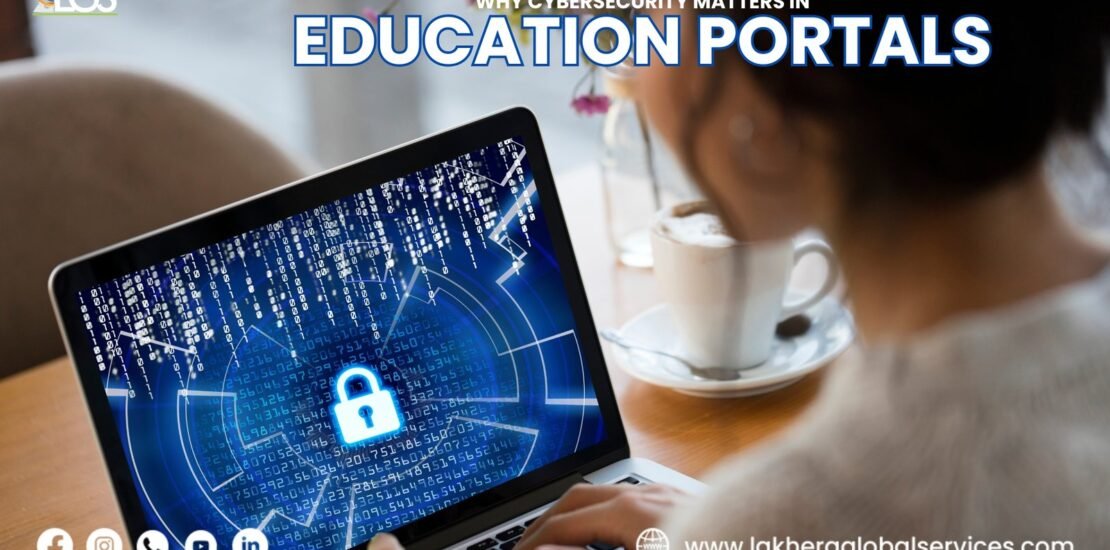Why Cybersecurity Matters in Education Portals
- April 23, 2025
- Posted by: admin amdin
- Category: Education Marketing

As educational institutions continue to adopt digital platforms for admissions, learning, administration, and student support, the need for robust cybersecurity has become more crucial than ever. Whether it’s a Learning Management System (LMS), ERP software, or student portals, the sheer volume of sensitive data being stored and transferred makes these systems prime targets for cyberattacks. In this blog, we explore why cybersecurity matters in education portals, especially for institutions striving to build trust, maintain compliance, and protect their academic reputation.
Introduction: The Digital Shift and Its Vulnerabilities
In the age of digital transformation, education portals have become central to operations in schools, colleges, and universities. These platforms host everything—from personal student information and financial details to academic records and internal communications.
However, with this convenience comes vulnerability. According to a 2024 global study on education sector breaches, nearly 25% of institutions reported data exposure or ransomware attacks. This highlights why cybersecurity matters in education portals—not just as a technical requirement, but as a strategic priority.
Key Reasons Cybersecurity Is Non-Negotiable for Education Portals
1. Protecting Student and Faculty Data
Education portals store a wide range of Personally Identifiable Information (PII), including names, addresses, contact numbers, bank details, Aadhaar numbers, and more. A breach can result in identity theft, financial fraud, and psychological harm.
Example:
Imagine a student’s personal and academic records being leaked and misused. It can tarnish not only their academic future but also the institution’s credibility.
2. Compliance With Government Regulations
Educational institutions in India must comply with the Information Technology Act, the upcoming Digital Personal Data Protection Act (DPDPA), and UGC guidelines for digital operations. Any failure to protect user data can result in heavy penalties and legal consequences.
Bonus:
Institutions with strong cybersecurity practices are more likely to receive government funding and recognition.
3. Safeguarding Financial Transactions
With the rise of online fee payment systems, donations, and edtech subscriptions, education portals now process financial transactions regularly. A weak cybersecurity infrastructure exposes this data to phishing attacks, card skimming, and financial fraud.
Stat to Note:
According to a 2023 RBI report, digital payment frauds in educational platforms increased by 18% in just one year.
4. Preventing Unauthorized Access and Data Manipulation
Hackers can manipulate grades, exam results, and attendance records if portals are left unprotected. This doesn’t just affect academic integrity—it directly impacts a student’s career path.
Tip:
Implementing multi-factor authentication (MFA) and encrypted logins can drastically reduce unauthorized access.
5. Maintaining Institutional Reputation
In the education industry, trust is everything. A single cyberattack or data leak can result in public backlash, negative press coverage, and loss of student enrollments. Protecting your digital assets is part of protecting your brand.
Pro Insight:
Parents are increasingly aware of online safety. A secure platform gives your institution a competitive edge in marketing and student acquisition.
6. Ensuring Uptime and Uninterrupted Services
Cyberattacks such as DDoS (Distributed Denial-of-Service) can bring down your entire system, disrupting classes, application deadlines, and fee payments. Ensuring cybersecurity means ensuring the continuity of services.
Real-World Example:
Imagine a college portal goes offline during final exam submissions or while fee payments are due. Even an hour of downtime could lead to hundreds of missed submissions or failed transactions. In such scenarios, lack of uptime isn’t just inconvenient—it’s costly and stress-inducing for both students and administrators.
How Cybersecurity Helps
Robust cybersecurity practices ensure uptime through:
- Firewall protections against network attacks
- Load balancing for traffic distribution
- Real-time threat monitoring
- Backup servers and failover systems
7. Supporting Remote and Mobile Learning Environments
With the shift to mobile-first and hybrid education models, your systems must be secure across devices and locations. Cybersecurity measures like device-level encryption, VPN access, and secure APIs protect learning on the go.
Why Cybersecurity Is Crucial in Remote Setups
While remote and mobile learning offers unmatched convenience, it also expands the attack surface for cybercriminals. Unlike tightly controlled campus networks, remote access involves:
- Home Wi-Fi (which may not be secure)
- Mobile data networks
- Multiple devices per student, including smartphones, tablets, and laptops
Example Scenario:
A student accesses their university portal from a mobile app while traveling. Thanks to secure login, encrypted communication, and automatic logout features, the session remains protected—even on public Wi-Fi.
Case Study: A Lesson from a Tier-2 College in Punjab
A private college in Punjab launched its own student portal to manage admissions, attendance, and exam results. Within six months, hackers exploited a vulnerability in the password reset function, gaining access to over 1,200 student profiles.
Impact:
- 3-week system downtime
- Legal action from concerned parents
- Loss of 11% enrollment the following year
- INR 15 lakh spent on recovery and upgrading security
Solution Adopted: After the breach, the college implemented a role-based access system, encrypted all personal records, trained faculty in cybersecurity hygiene, and partnered with a managed security service provider. The trust was slowly regained.
Essential Cybersecurity Measures for Educational Portalsc
| Measure | Description | Benefit |
| Multi-Factor Authentication (MFA) | Requires multiple credentials for login | Prevents unauthorized access |
| Data Encryption | Secures data during storage and transmission | Protects sensitive information |
| Regular Security Audits | Periodic assessment of vulnerabilities | Identifies and mitigates risks early |
| User Role Management | Defines user access levels | Minimizes risk of internal breaches |
| Firewalls & Anti-Malware | Blocks malicious attacks | Ensures safe browsing and operations |
| Backup & Recovery Solutions | Stores backup data off-site or on the cloud | Ensures business continuity after attacks |
| Cybersecurity Training | Educates staff and students on digital hygiene practices | Reduces risk of human error |
Conclusion: Don’t Let a Breach Define Your Institution
Cybersecurity is not just an IT department’s concern—it’s a leadership-level responsibility. As digital portals become the face and function of modern education, ensuring their safety is key to building a trustworthy and resilient institution.
At Lakhera Global Services Pvt Ltd, we understand how cybersecurity matters in education portals. We offer digital solutions tailored for educational institutions, including secure website development, portal protection, lead generation, and branding—all with cybersecurity best practices at the core.
Secure Your Digital Future Today
Let us help you build a student-friendly, secure, and scalable online presence.
Visit: www.lakheraglobalservices.com
FAQs: Why Cybersecurity Matters in Education Portals
1. Why are education portals frequent targets for cyberattacks?
They store valuable data like student records, financial info, and academic credentials, making them attractive to hackers.
2. What are the signs of a cyberattack on an education portal?
Slow performance, unauthorized changes in data, login issues, and phishing emails are common signs.
3. What is the role of students and faculty in cybersecurity?
Both need training to identify suspicious activities, manage passwords securely, and follow digital safety guidelines.
4. How often should an institution conduct security audits?
Ideally, once every 6 months, or immediately after major system upgrades or reported incidents.
5. Can Lakhera Global Services help with portal security?
Yes, we offer full-scale digital security and branding solutions designed specifically for educational institutions.





